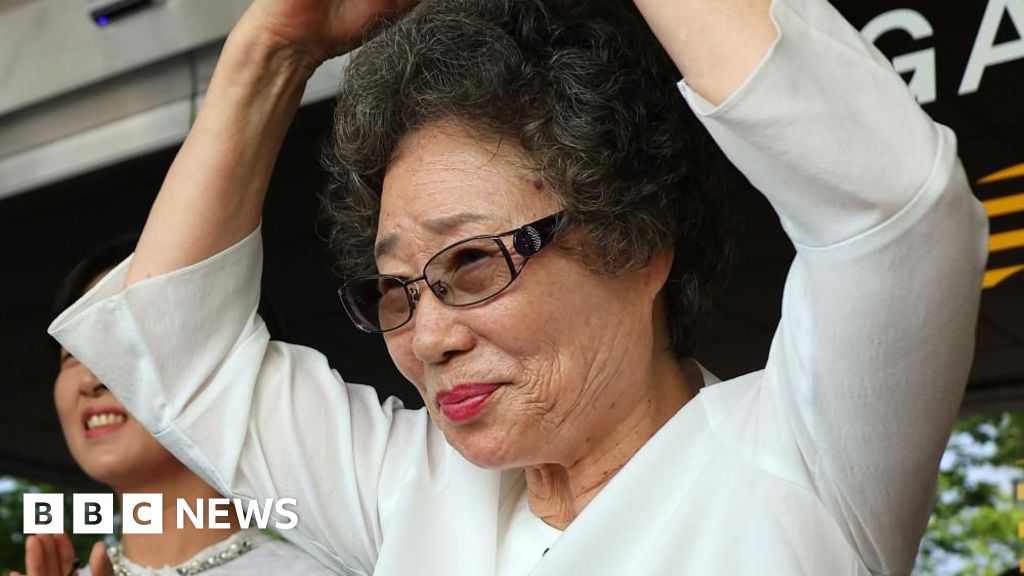【新闻摘要】
韩国78岁老奶奶崔茉莉终于等来了迟到的正义!1964年,18岁的她为反抗性侵咬掉施暴者1.5厘米舌头,结果反被判刑10个月(缓刑2年),而施暴者仅因"非法入侵和恐吓"获刑6个月。这场持续61年的"反杀案"最近被韩国#MeToo运动翻出,检方终于在重审时当庭道歉:"让性侵受害者背负罪犯之名,我们深感愧疚"。最讽刺的是,这起案件还被写进韩国法律教科书,成为"法院不承认性暴力自卫权"的经典案例。当9月10日最终宣判前,崔奶奶在法庭外高举拳头喊出"我们赢了"时,连路人都忍不住鼓掌——原来正义只是迟到了半个多世纪,但终究没有缺席!
---
**S Korea prosecutors apologise to woman convicted for self-defence in 1964 rape attempt**
韩国检方就1964年强奸未遂案中判自卫女子有罪道歉
**3 hours ago Share Save Ian Aikman BBC News Share Save**
3小时前 分享 保存 BBC记者伊恩·艾克曼 分享 保存
**EPA**
EPA
Prosecutors in South Korea have apologised to a woman who was convicted for defending herself during a sexually violent attack more than 60 years ago. Choi Mal-ja was sentenced to 10 months in prison, suspended for two years, for biting off part of her attacker's tongue as he allegedly tried to rape her in 1964, when she was 18 years old. Inspired by the country's #MeToo movement, Ms Choi, now 78, has campaigned for years to have her conviction overturned. Her retrial began in the city of Busan on Wednesday, where prosecutors issued an apology and asked for the court to quash her guilty verdict.
韩国检方向一名60多年前在性暴力袭击中因自卫被定罪的女性道歉。1964年,18岁的崔茉莉在据称遭强奸时咬掉袭击者部分舌头,被判10个月监禁(缓刑2年)。受韩国#MeToo运动启发,现年78岁的崔茉莉多年来一直争取推翻定罪。周三在釜山开始的重审中,检方发表道歉并要求法院撤销其有罪判决。
"For 61 years, the state made me live as a criminal," Ms Choi told reporters outside the court ahead of the hearing. She said she hoped future generations could live a happy life free from sexual violence. At the start of the trial, Busan's Chief Prosecutor Jeong Myeong-won said"we sincerely apologise"."We have caused Choi Mal-ja, a victim of a sex crime who should have been protected as one, indescribable pain and agony." A final ruling is scheduled for 10 September, with legal observers expecting the court to overturn Ms Choi's conviction. Outside the courtroom after the hearing, Ms Choi raised her fist and said:"We won!" She celebrated by embracing campaigners from civic organisations who were there to support her.
"61年来,国家让我以罪犯身份活着,"崔茉莉在听证会前向法庭外的记者表示。她说希望后代能过上免于性暴力的幸福生活。审判开始时,釜山检察长郑明元表示"我们诚挚道歉","我们给本应受保护的性犯罪受害者崔茉莉造成了无法形容的痛苦"。最终裁决定于9月10日,法律界人士预计法院将推翻崔茉莉的定罪。听证会后,崔茉莉在法庭外举拳高呼"我们赢了!",并与支持她的民间组织活动人士拥抱庆祝。
In 1964, an 18-year-old Choi Mal-ja was attacked by a 21-year-old man, who forced his tongue into her mouth as he pinned her to the ground in the southern town of Gimhae, according to court records. Ms Choi escaped the attack by biting off 1.5cm (0.59in) of the aggressor's tongue. The man was sentenced to six months in prison, suspended for two years, for trespassing and intimidation. He was never convicted of attempted rape. Ms Choi was given a harsher sentence than her attacker for causing him grievous bodily harm. The court at the time said her actions had exceeded the"reasonable bounds" of self-defence. Ms Choi's case has since been cited in legal textbooks in South Korea as a classic example of a court failing to recognise self-defence during sexual violence.
据法庭记录,1964年,18岁的崔茉莉在南部金海市遭21岁男子袭击,被按倒在地时对方将舌头强行伸入其口中。崔茉莉咬掉袭击者1.5厘米(0.59英寸)舌头得以脱身。该男子因非法入侵和恐吓被判6个月监禁(缓刑2年),但从未因强奸未遂被定罪。崔茉莉因造成对方严重身体伤害被判比袭击者更重的刑罚。当时法院称其行为超出"合理自卫范围"。此案后被韩国法律教科书引用为法院不承认性暴力中自卫权的典型案例。
'Justice is alive in this country'
"这个国家的正义还活着"
The case has drawn renewed attention amid South Korea's #MeToo movement, with activists highlighting how women's rights have been systematically ignored by the judiciary."This is not just about one woman's suffering - it exposes how the legal system has failed generations of Korean women," said Park Ji-hyun from the Korean Women's Association. Current laws now recognise that victims of sexual violence cannot be expected to exercise"proportionate force" when defending themselves, but campaigners say more reforms are needed. Ms Choi's lawyer Lee Sang-ji told the BBC that the apology marked"the beginning of justice finally being served". As she left court on Wednesday, Ms Choi told supporters:"Justice is alive in this country."
随着韩国#MeToo运动兴起,该案重新引发关注,活动人士强调司法系统如何系统性忽视女性权利。"这不仅关乎一个女性的痛苦,更暴露法律体系对几代韩国女性的辜负,"韩国女性协会的朴智贤表示。现行法律现已承认性暴力受害者自卫时无法行使"相称武力",但活动人士称仍需更多改革。崔茉莉的律师李相基告诉BBC,这次道歉标志着"正义终于得到伸张的开始"。周三离开法庭时,崔茉莉对支持者说:"这个国家的正义还活着。"
**Reuters**
路透社
The retrial has sparked a national conversation about historical injustices against women in South Korea. Television networks have aired special programmes revisiting the case, while social media users have flooded platforms with messages of support for Ms Choi under the hashtag #JusticeForChoiMalja. Constitutional law professor Kim Eun-ju at Seoul National University noted that until 1994, South Korea's criminal code did not even recognise marital rape as a crime."This case holds up a mirror to our society's patriarchal past," she said."The fact that it took six decades for this wrong to be righted shows how far we still have to go."
重审引发韩国全国关于历史上对女性不公的讨论。电视台播出重温该案的特别节目,社交媒体用户以#崔茉莉的正义#标签发帖支持她。首尔国立大学宪法学教授金恩珠指出,直到1994年,韩国刑法甚至不承认婚内强奸是犯罪。"此案映照出我们社会父权制的过去,"她说,"纠正这个错误花了60年,表明我们还有很长的路要走。"
With the final verdict expected next month, women's rights groups are planning vigils outside the Busan court. For Ms Choi, the apology has already brought a measure of closure."I can finally look my grandchildren in the eye and tell them their grandmother is not a criminal," she said.
随着最终判决预计下月公布,妇女权益团体计划在釜山法院外守夜。对崔茉莉而言,道歉已带来某种了结。"我终于可以直视孙辈的眼睛,告诉他们祖母不是罪犯,"她说。

